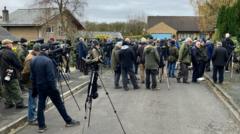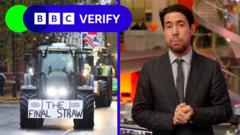
Hong Kong Court Sentences Pro-Democracy Leaders in Landmark National Security Trial
A Hong Kong court has delivered significant prison sentences to key pro-democracy activists in a controversial national security law trial that marks a pivotal moment for the city’s political landscape. The case, involving the so-called Hong Kong 47 group, highlights the ongoing tension between pro-democracy forces and Beijing’s increasing control over the region.
The trial centered around a 2020 plan by activists to organize an unofficial primary election for the Legislative Council, aimed at increasing the opposition’s ability to block pro-Beijing government bills. Of the 47 activists, opposition lawmakers, and ordinary citizens charged, most were found guilty of conspiring to attempt subversion, with only two acquitted.
Prominent activists received substantial sentences, with Benny Tai, a former law professor who conceived the primary election plan, receiving the longest sentence of 10 years. Joshua Wong, another well-known pro-democracy figure, was sentenced to more than four years in prison. Other notable convicts include former journalist Gwyneth Ho and former lawmakers Claudia Mo and Leung Kwok-hung, who received sentences ranging from four to seven years.
The trial represents the largest application of the national security law that China imposed on Hong Kong following the massive pro-democracy protests of 2019. While Beijing and Hong Kong’s governments argue that the law is necessary to maintain stability, international observers and human rights advocates see it differently.
The United States has described the trial as “politically motivated,” and many observers believe the sentencing significantly weakens Hong Kong’s pro-democracy movement and undermines the city’s rule of law. The case has effectively allowed China to cement its control over Hong Kong, dramatically reducing political opposition and dissent.
During the 2020 primary, hundreds of thousands of Hongkongers had participated in the unofficial election, which activists maintained was a legal political process. However, government officials accused the participants of attempting to “overthrow” the government. The court’s ruling agreed with the prosecution, arguing that the plan would have created a constitutional crisis.
The trial has generated enormous public interest, with dozens of Hongkongers queuing outside the court days before sentencing to secure spots in the public gallery. Despite the harsh sentences, the case represents a critical moment in Hong Kong’s ongoing struggle between democratic aspirations and increasing mainland Chinese control.
Beijing and Hong Kong’s governments maintain that the convictions serve as a warning against forces attempting to undermine national security. However, the international community continues to view the trial and sentencing as a significant erosion of the political freedoms previously guaranteed to Hong Kong.
The sentencing marks a decisive moment in Hong Kong’s political transformation, potentially signaling the end of meaningful political opposition in the city.









